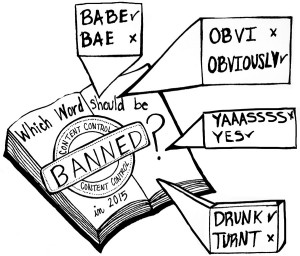Idea behind Time’s word poll is skewed
May the odds be ever in your favor, because several of 2014’s favorite words are entering a virtual Hunger Games. There’s a catch, though. Rather than bringing glory to its home district, the winning word will be the one with the most notoriety. On Nov. 12, Time magazine published its fourth annual word banishment poll. Among the bank of words and phrases, readers vote to eliminate for the next year are “sorry not sorry,” “basic” and, most concerning, “feminist.” The criteria, according to Time, are if the word elicits a reaction where you “definitely cringe,” “exhale pointedly” or succumb to a fit of sticking chopsticks into your ears. This yearly word-shaming that Time organizes, however, is silly and unnecessary, because slang words are important pop culture artifacts.
I agree that, like everything else, words can be very annoying when overused. I roll my eyes at Instagram users who have replaced the notion of “love” with “bae.” (Though I have to agree that pizza is pretty bae.) And I might be committing treason against Los Angeles, but “kale,” a trend inundating social media and brandished by Time, is pretty much rabbit food. I don’t, however, employ 1984 tactics and try to eliminate common speech from everyday language. It’s an act akin to commanding people to stop using vowels or articles when talking. Words are the most obvious forms of expression, and sometimes the most appropriate articulation of what we know is a trite term. This trite term might not be polysyllabic SAT words or high-brow French phrases, but it derives from extensions of the world around us. Thus, these words are applicable.
Words sometimes expire and cycle out. Or sometimes they become engrained in our vernacular forever and are made an entry in the dictionary. The top words scathed by Time in years past include “OMG,” “YOLO” and “twerk.” While “YOLO” has become a face-palm version of carpe diem, “twerk,” along with “selfie,” was defined by the Oxford Dictionary Online. Either way, the elasticity of a certain word isn’t in the hands of Time. It is, however, in the hands of time — the tick-tock version. As these words fade out of our jargon, they are still tacked to a certain era. Time’s survey has no effect on ending the trend because it never completed what they set out to do, which is eradicate the word. The survey’s efforts, therefore, are pointless.
The giant elephant in the room is the alarming presence of “feminist” on this year’s list, which is leading the poll with 48 percent. In a sense, the inclusion signals positive progression. If “feminist” was included as one of the most hated words of the year, it shows it has presided our consciousness and dialogue. This illustrates the influence of the word, inspiring the conversations we should be having about equality. But the very thought of banning the word? That’s ludicrous. As an explanation for including “feminist,” Time included a statement on the list: “You have nothing against feminism itself, but when did it become a thing that every celebrity had to state their position on whether this word applies to them, like some politician declaring a party? Let’s stick to the issues and quit throwing this label around like ticker tape at a Susan B. Anthony parade.”
I agree “feminist” doesn’t belong on a “Hello my name is” nametag, but the fact that there are now more faces of feminism than just Gloria Steinem and Susan B. Anthony deserves to be celebrated. Feminist is a word that describes someone who believes that men and women should have equal rights. It’s a label that includes everyone, so the proliferation of this word can never become trite. The fact that Time included it as a word to be “banned” proves why their poll is futile — feminism will be remembered as having been revitalized in 2014, instead of being banished.
The magazine has since apologized for including “feminist” on the list — as it should. Managing Editor Nancy Gibbs added a note, saying, “While we meant to invite debate about some ways the word was used this year, that nuance was lost, and we regret that its inclusion has become a distraction from the important debate over equality and justice.”
Putting aside the controversy of including “feminist,” the idea behind the list seems wrong to begin with. With the poll, Time might have intended to draw attention to how modern language has shifted from text talk to hashtag lingo, and how the context in which they’re used has transformed. Ultimately, though, it’s a bad decision on Time’s part to want to eradicate words, and especially the ones selected this year. Some words come and go, but we remember them as defining an era. Some might think of Time as being scholarly in this case, but to quote the popular ’90s phrase, as if!
Danni Wang is a sophomore majoring in psychology. Her column, “Pop Fiction,” runs Mondays.


